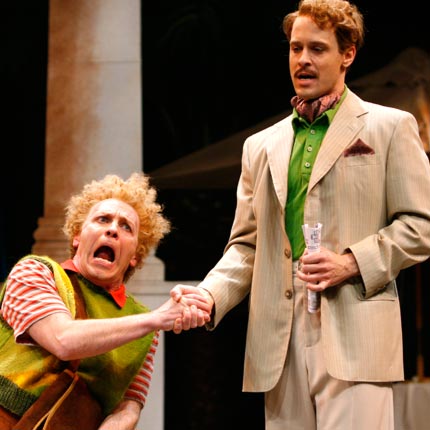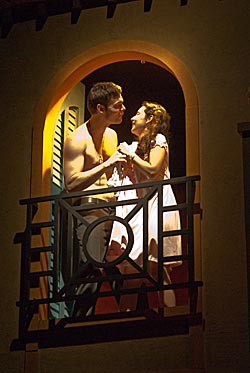Today’s Wall Street Journal drama column contains the latest of my reports from Chicago, this time on Chicago Shakespeare Theater’s production of The Comedy of Errors. In addition, I review the Public Theater’s Shakespeare in the Park production of Hamlet. Here’s an excerpt.
* * *
I didn’t know that Chicago Shakespeare would be receiving a regional-theater Tony when I made plans to see Barbara Gaines’ production of “The Comedy of Errors.” It’s pure dumb luck that this review is running less than a week after the company was honored for the unfailing excellence of its work–and that the show I came to town to see is a model of its intelligent yet accessible style. “I don’t think Shakespeare set out to teach us anything,” Ms. Gaines, the company’s founder and artistic director, has said. “He just wanted to tell a great story.” If so, then this “Comedy of Errors” must be what the Bard had in mind, for the only “lesson” it teaches is that loud laughter in large quantities is good for the soul….
 Not only is “The Comedy of Errors” complicated to the max, but it also happens to be Shakespeare’s shortest play, thus giving smart directors plenty of room to make still more mischief. Ms. Gaines, for instance, has turned it into a play within a play: In her version, “The Comedy of Errors” is being filmed on an English soundstage during the Battle of Britain. The characters become caricatures of recognizable theatrical types–the pompous actor-peer, the promiscuous movie star, the American crooner turned Hollywood heart-throb–and the comic ante is upped when the War Ministry orders Shepperton Studios to wrap up the shoot in 48 hours.
Not only is “The Comedy of Errors” complicated to the max, but it also happens to be Shakespeare’s shortest play, thus giving smart directors plenty of room to make still more mischief. Ms. Gaines, for instance, has turned it into a play within a play: In her version, “The Comedy of Errors” is being filmed on an English soundstage during the Battle of Britain. The characters become caricatures of recognizable theatrical types–the pompous actor-peer, the promiscuous movie star, the American crooner turned Hollywood heart-throb–and the comic ante is upped when the War Ministry orders Shepperton Studios to wrap up the shoot in 48 hours.
Ron West, a veteran of Chicago’s Second City comedy troupe, was assigned the daunting task of writing the studio sequences, and brings it off without a hitch. Needless to say, he’s no Shakespeare, but his scenes are full of witty dialogue and neat inside jokes: “I’m just a bit player. I usually play someone whose first name is ‘First.'” His contribution to the production is closely comparable in quality to the ingenious book that Sam and Bella Spewack wrote for “Kiss Me, Kate,” Cole Porter’s musical version of “The Taming of the Shrew,” which doubtless inspired Ms. Gaines’s no less ingenious take on “The Comedy of Errors.”
For all the cleverness of Mr. West’s scenes, what makes this production work is the electric verve with which Ms. Gaines has staged Shakespeare’s play. The slapstick alone is worth the price of the ticket…
Back in the Big Apple, the Public Theater is putting on “Hamlet” in Central Park. I wish I could say that it’s half as good as “The Comedy of Errors,” but this “Hamlet” (which runs for just short of three-and-a-half hours) is, like most Shakespeare in the Park productions, an exceedingly mixed bag. Oskar Eustis’ staging is an off-the-rack modern-dress update played in front of a stark white wall augmented by the same old black scaffolding and fluorescent lights. A few unexpected things happen along the way–the play within the play, for instance, is a puppet show designed by Basil Twist, the best of all possible puppeteers–but the rest of Mr. Eustis’ “surprises” amount to little more than generic postmodernism…..
* * *
Read the whole thing here.
Archives for 2008
TT: Bob Dylan’s day job
 Now that the pending merger of XM Satellite Radio and Sirius Satellite Radio is in the news, it struck me that the time had come to write a “Sightings” column about Theme Time Radio Hour, the radio show that Bob Dylan hosts each Wednesday morning on XM’s Deep Tracks channel. It is, in my opinion, one of the most interesting and original music-oriented shows on radio, and the fact that it is produced by XM strikes me as no less worthy of note.
Now that the pending merger of XM Satellite Radio and Sirius Satellite Radio is in the news, it struck me that the time had come to write a “Sightings” column about Theme Time Radio Hour, the radio show that Bob Dylan hosts each Wednesday morning on XM’s Deep Tracks channel. It is, in my opinion, one of the most interesting and original music-oriented shows on radio, and the fact that it is produced by XM strikes me as no less worthy of note.
Is Bob Dylan bringing us a taste of the future of satellite radio–or a relic from the distant past of terrestrial radio? To find out, pick up a copy of Saturday’s Wall Street Journal, turn to the new “Lifestyle” section, and check out “Sightings.”
UPDATE: Read the whole thing here.
TT: Almanac
Despising,
For you, the city, thus I turn my back;
There is a world elsewhere.
William Shakespeare, Coriolanus
OGIC: Reading diary, part two
Funny that while the fortunes of the sentence flicker, I am immersed in a second consecutive book whose grammatical units–sentences and paragraphs alike–are, one after the other, superlatively made. First it was Netherland, covered in my post yesterday. Now it’s Sybille Bedford’s A Legacy. Fifty pages in, I’m really quite awed. Here’s a sentence about the narrator’s well-to-do German grandparents:
While members of what might have been their world were dining to the sounds of Schubert and of Haydn, endowing research and adding Corot landscapes to their Bouchers and the Delacroix, and some of them were buying their first Picasso, the Merz’s were adding bell-pulls and thickening the upholstery.
And a paragraph that shortly follows:
They took no exercise and practised no sport; they kept no animals–except carriage horses–and none were allowed in the house. The caretaker couple kept a canary in their basement by the furnace, but no truffled nose had ever snuffed the still hot air upstairs, no padded paw had trod the Turkey pile, no tooth had gnawed, no claw ripped the mahogany and the plush, and there was a discreet mouse-trap set in every room. The Merz’s had no friends, a word they seldom used; they saw no-one besides the family, the doctor and an occasional, usually slightly seedy, guest asked to occupy the fourteenth place at the table. They were never alone; when it wasn’t the barber, it would be the manicure. Grandmama Merz had never taken a bath without the presence and assistance of her maid. They did not go to shops. Things were sent to them on approval, and people came to them for fittings. They never read. There was a smoking-room, and a billiard-room nobody used, but there was not so much as a courtesy library, and I cannot ever remember seeing a book about.
Dorothy Parker, a woman not easily scared, called A Legacy “almost terrifyingly brilliant.” I can only account for the terror in her reaction by imagining the encounter with a writer at least her equal for wit and incisiveness posed a threat. The encounter certainly brought out her own incisiveness; her critical comment on the novel (part of an Esquire group review of the best fiction of 1957) begins and ends with these three words. The book’s brilliance is evident from the first page, but, at least so far, it has me feeling merely appreciative.
TT: So you want to see a show?
Here’s my list of recommended Broadway, off-Broadway, and out-of-town shows, updated weekly. In all cases, I gave these shows favorable reviews (if sometimes qualifiedly so) in The Wall Street Journal when they opened. For more information, click on the title.
Warning: Broadway shows marked with an asterisk were sold out, or nearly so, last week.
BROADWAY:
• Alfred Hitchcock’s The 39 Steps (comedy, G, suitable for bright children, reviewed here)
• August: Osage County * (drama, R, adult subject matter, reviewed here)
• Avenue Q (musical, R, adult subject matter and one show-stopping scene of puppet-on-puppet sex, reviewed here)
• Boeing-Boeing * (comedy, PG-13, cartoonishly sexy, reviewed here)
• A Chorus Line (musical, PG-13/R, adult subject matter, closes Aug. 17, reviewed here)
• Gypsy (musical, PG-13, adult subject matter, reviewed here)
• The Little Mermaid * (musical, G, entirely suitable for children, reviewed here)
• November (comedy, PG-13, profusely spattered with obscene language, closes July 13, reviewed here)
• Passing Strange (musical, PG-13, adult subject matter, reviewed here)
• South Pacific * (musical, G/PG-13, some sexual content, brilliantly staged but unsuitable for viewers acutely allergic to preachiness, reviewed here)
OFF BROADWAY:
• Adding Machine (musical, PG-13, adult subject matter, too musically demanding for youngsters, closes Aug. 31, reviewed here)
REOPENED OFF BROADWAY:
• The Fantasticks (musical, G, suitable for children capable of enjoying a love story, reviewed here)
IN SUBURBAN CHICAGO:
• The Lion in Winter (serious comedy, PG-13, adult subject matter, closes Aug. 3, reviewed here)
CLOSING SOON IN WASHINGTON, D.C.:
• Julius Caesar/Antony and Cleopatra (drama, PG-13, adult subject matter, too musically demanding for youngsters, performed in alternating repertory through July 6, reviewed here)

CLOSING NEXT WEEK IN MONTGOMERY, ALA.:
• The Count of Monte Cristo/Romeo and Juliet (drama, G/PG-13, performed in alternating repertory through June 29, reviewed here)
CLOSING NEXT WEEK ON BROADWAY:
• Sunday in the Park with George * (musical, PG-13, too complicated for children, closes June 29, reviewed here)
CLOSING SUNDAY ON BROADWAY:
• Cry-Baby (musical, PG-13, mildly naughty and very cynical, reviewed here)
CLOSING SUNDAY OFF BROADWAY:
• Port Authority (drama, PG-13/R, adult subject matter, reviewed here)
TT: Almanac
“True life is elsewhere. We are not in the world.”
Arthur Rimbaud, “Délires I”
OGIC: Reading diary
A review in the New York Times Book Review and one by James Wood in the New Yorker, both brimming with superlatives, propelled me toward Joseph O’Neill’s Netherland earlier this spring. The book immediately became the foremost pleasure of the two weeks during which I read it. In the mornings and afternoons, I walked to my train with added briskness; on even short ventures from the apartment, I jammed the book into my too-small purse. I enjoyed it a lot.
I did not so much enjoy the blurb it received from Jonathan Safran Foer:
“New York is not what most people imagine it to be. Just as marriage, family, friendship, and manhood are not. Netherland is suspenseful, artful, psychologically pitch perfect, and a wonderful read. But more than any of that, it’s revelatory. Joseph O’Neill has managed to paint the most famous city in the world, and the most familiar concept in the world (love), in an entirely new way.”
Blurbing a book really brings out the worst in some people. Why not let the last sentence stand? Or, if that seemed too skimpy (I would call it concise), begin with the third? The smug first two sentences don’t do the book any favors. Buy this book, dear reader, and have your gross misconceptions about New York and life in general corrected! Fun.
The book can carry its own water, anyway. Written with exacting precision in the staid, somber voice of a Dutch-born London banker working in Manhattan after 9/11, it tells how he is assimilated into immigrant life in America via the cricket fields tucked away in many a corner of New York and environs. With his half-estranged wife back in London with their son, he becomes fascinated with a mysterious acquaintance from cricket, Chuck Ramkissoon, playing Nick to Ramkissoon’s Gatsby.
The book holds you at a bit of a distance. I didn’t warm up to it or its characters, but I clamored for more and more of its delicately structured sentences and paragraphs. They seemed decadent and nourishing at the same time, and they did as much as anything else in the book to delineate the main character. Here he is remembering his uneasiness during his last visit to his mother’s home, a month before her unforeseen death:
I stood at the window, waiting for the next arrival of light. The lighthouse had been mesmeric to my boy self. He was an only child and it must be that at night he habitually stood at his bedroom window alone; but my recollection of watching the light travel out of Scheveningen contained the figure of my mother at my side, helping me to look out into the dark. She answered my questions. The sea was the North Sea. It was filled with shops queuing for entry to Rotterdam. Rotterdam was the biggest port in the world. The breakwaters were perpendicular to the beach and stopped the beach from being washed away. The jellyfish in the water might sting you. The blue of the jellyfish was the color indigo. Seven particular stars made the outline of a plow. When you died, you went to sleep.
And:
Some people have no difficulty in identifying with their younger incarnations: Rachel, for example, will refer to episodes from her childhood or college days as if they’d happened to her that very morning. I, however, seem given to self-estrangement. I find it hard to muster oneness with those fomer selves whose accidents and endeavors have shaped who I am now. The schoolboy at the Gymnasium Haganum; the Leiden student; the clueless trainee executive at Shell; the analyst in London; even the thirty-year-old who flew to New York with his excited young wife: my natural sense is that all are faded, by the by, discontinued.
Gatsby is the obvious precursor for Netherland, but there’s something of Henry James’s Lambert Strether in Hans, too. His choice is different and many of the circumstances reversed in a resolutely post-Victorian world, but the novel does have a few moral disillusionments in store for him on a similar scale. But then again, I may be stretching the case–this may just be one of those books that has a way of evoking all the major landmarks in one’s reading history.
TT: Snapshot
Margot Fonteyn and Rudolf Nureyev dance the balcony scene in a 1966 performance by the Royal Ballet of Prokofiev’s Romeo and Juliet, choreographed by Kenneth MacMillan:
(This is the latest in a weekly series of arts-related videos that appear in this space each Wednesday.)
